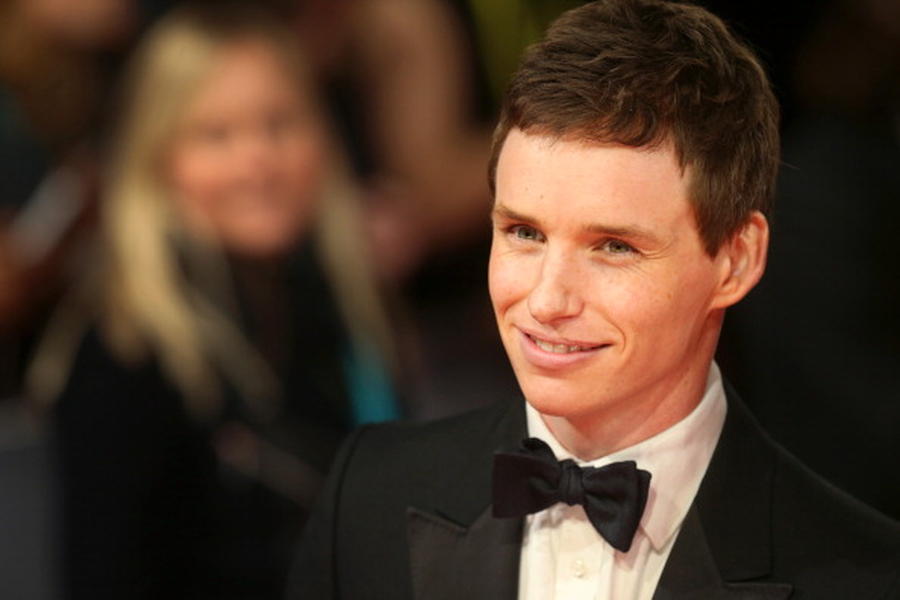Eddie Redmayne explains why it was so hard to portray Stephen Hawking


A free daily email with the biggest news stories of the day – and the best features from TheWeek.com
You are now subscribed
Your newsletter sign-up was successful
Imagine doing an impression of a well-known individual while standing in front of a crowd. Now imagine that well-known individual is one of the smartest men alive — and he's part of that crowd. Now take that crowd, turn it into thousands and thousands of people, and pretend that you're actually being projected onto a huge screen in front of them.
That, in essence, is how it felt for Eddie Redmayne to portray Stephen Hawking in The Theory of Everything, the movie that opened last Friday that tells the famed physicist's story. Redmayne told The Washington Post that after landing the part, he realized the challenges that awaited him: Hawking is a genius; Hawking has ALS, a debilitating physical condition that has severely limited his movement; Hawking is still alive, so "he will be the ultimate critic."
Redmayne told the Post that he was "reliant" on co-star Felicity Jones, who plays Hawking's first wife Jane in the film, to fill in the gaps left by his physical limitations. "So often I would say, 'I can't do that,'" Redmayne said, so Jones "had to physically drive the scenes."
The Week
Escape your echo chamber. Get the facts behind the news, plus analysis from multiple perspectives.

Sign up for The Week's Free Newsletters
From our morning news briefing to a weekly Good News Newsletter, get the best of The Week delivered directly to your inbox.
From our morning news briefing to a weekly Good News Newsletter, get the best of The Week delivered directly to your inbox.
Adding to the challenge was the fact that Redmayne says Stephen Hawking "has perhaps the most charismatic face I've ever seen, and also the most expressive." The actor says that's likely because Hawking's body is so restricted elsewhere. "All of the facilities we have of communication, whether it's gesture or tone of voice... when they go, it's like all of that energy is channeled into the muscles you can move," he said.
So, how does the Les Miserables vet think he fared in portraying one of science's greatest minds? "How do you become a genius?" he told the Post. "There's definitely a moment when you have to go, 'I will never be Stephen Hawking.'"
A free daily email with the biggest news stories of the day – and the best features from TheWeek.com
Kimberly Alters is the news editor at TheWeek.com. She is a graduate of the Medill School of Journalism at Northwestern University.
-
 Why is the Trump administration talking about ‘Western civilization’?
Why is the Trump administration talking about ‘Western civilization’?Talking Points Rubio says Europe, US bonded by religion and ancestry
-
 Quentin Deranque: a student’s death energizes the French far right
Quentin Deranque: a student’s death energizes the French far rightIN THE SPOTLIGHT Reactions to the violent killing of an ultraconservative activist offer a glimpse at the culture wars roiling France ahead of next year’s elections
-
 Secured vs. unsecured loans: how do they differ and which is better?
Secured vs. unsecured loans: how do they differ and which is better?the explainer They are distinguished by the level of risk and the inclusion of collateral
-
 ‘One Battle After Another’ wins Critics Choice honors
‘One Battle After Another’ wins Critics Choice honorsSpeed Read Paul Thomas Anderson’s latest film, which stars Leonardo DiCaprio, won best picture at the 31st Critics Choice Awards
-
 Son arrested over killing of Rob and Michele Reiner
Son arrested over killing of Rob and Michele ReinerSpeed Read Nick, the 32-year-old son of Hollywood director Rob Reiner, has been booked for the murder of his parents
-
 Rob Reiner, wife dead in ‘apparent homicide’
Rob Reiner, wife dead in ‘apparent homicide’speed read The Reiners, found in their Los Angeles home, ‘had injuries consistent with being stabbed’
-
 Hungary’s Krasznahorkai wins Nobel for literature
Hungary’s Krasznahorkai wins Nobel for literatureSpeed Read László Krasznahorkai is the author of acclaimed novels like ‘The Melancholy of Resistance’ and ‘Satantango’
-
 Primatologist Jane Goodall dies at 91
Primatologist Jane Goodall dies at 91Speed Read She rose to fame following her groundbreaking field research with chimpanzees
-
 Florida erases rainbow crosswalk at Pulse nightclub
Florida erases rainbow crosswalk at Pulse nightclubSpeed Read The colorful crosswalk was outside the former LGBTQ nightclub where 49 people were killed in a 2016 shooting
-
 Trump says Smithsonian too focused on slavery's ills
Trump says Smithsonian too focused on slavery's illsSpeed Read The president would prefer the museum to highlight 'success,' 'brightness' and 'the future'
-
 Trump to host Kennedy Honors for Kiss, Stallone
Trump to host Kennedy Honors for Kiss, StalloneSpeed Read Actor Sylvester Stallone and the glam-rock band Kiss were among those named as this year's inductees
